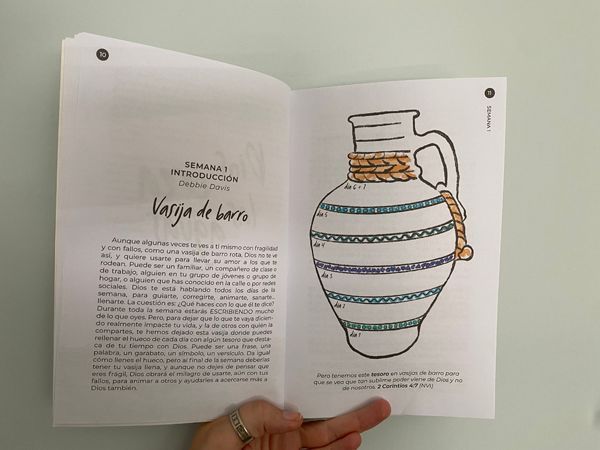
Write it, draw it, pray it
Christ-followers in North America have a wealth of Christian devotionals to choose from, but this isn’t the case throughout the world. In Spain, for instance, most evangelical Christian literature comes from Latin America. Like the United States and England, the languages are (mostly) the same, but the cultures are not.
SEND Spain’s youth ministry team sensed that Spanish young people needed a resource that reflected their culture and helped them learn longstanding methods for personally growing in the Lord.
Enter “ Escribete ,” an eight-week, hand-illustrated devotional for Spanish youth.
Escribete —“you write it” in Spanish—takes its name from Jeremiah 30:2, which reads, “This is what the LORD, the God of Israel, says: ‘Write in a book all the words I have spoken to you.’”
Though writing does, indeed, play a part in the devotional’s daily reflections, the authors know their young audience’s multimedia world well. So, they encourage believers to interact with the Scripture passages by illustrating them, paraphrasing them, and visualizing them like a movie scene.
“For example, for Mark 4:35-41, they draw the boat in the storm, and then write about the storms in their lives,” said Brooke Nagel, a SEND Spain missionary and Escribete author.
Escribete also offers fresh ideas for prayer, like writing out a conversation between you and God, and encourages Sabbath rest, community connection and prayer walks.
“The idea isn’t that they’re just doing a study, but that they’re learning from God,” Brooke said. “They’re learning how to spend time with God on their own, so that they can connect with the Lord without needing a devotional.”

SEND missionary Kara Barkman contributed illustrations to the journal, while Giles and Debbie Davis were authors. The team plans to hand the writing over to Spanish youth leaders in the future.
The first issue, themed around water, proved so popular that a second printing is under way. The second issue, on the Fruits of the Spirit, will come out in September. The team has nine themes they’d like to explore.
Escribete’s first issue was written by three missionaries and one Spanish youth leader, but future issues will have more input from Spanish youth leaders. By the third issue, the team plans to welcome an all-Spanish writing team.
“I’m really excited to have more youth leaders writing,” Brooke said. “They’re in their early 20s, and it’s great to see them grow in their confidence—now they know that they can write, they can plan things.”
In addition to helping Spanish believers grow in their faith, some are finding that Escribete helps them share their faith, too.
“My roommate is going through Escribete with a Catholic friend,” Brooke said. “It’s helping them have conversations about what is different between the evangelical church and the Catholic church, and why we are free and how we can talk to God.”
Escribete
is not sold for profit. If you would like to help offset the cost, you can donate here.
Additional Posts





